#vinder

For the past 58 years, Doctor Who has introduced some novel concepts. The police box that is bigger on the inside. The traveller through time and space who dies and regenerates. But I don’t think we’ve ever had an episode where the title of the story is a direct reference to the fandom. Because isn’t that what we all are at the moment- “Survivors of the Flux”? I’m barely holding on at this point. You’ve seen me go from cautiously optimistic to beat down. I believe that if you were to compare that to stages of grief I’m somewhere around acceptance. I am the antelope saying to the lion- “Fine, eat of me.”
I’m being dramatic, of course. Think of it as a reaction to hunger. I need to “eat,” the Doctor Who equivalent of a Snickers. I’ve definitely run a marathon, and I have a Mighty Jagrafess of the Holy Hadrojassic Maxarodenfoe sized thirst. My point is that I’m having a hard time approaching this objectively. I don’t know what’s good Doctor Who anymore. I’m an anaemic mess trying to subsist on more sizzle than steak. But that’s enough with the food puns. I’m stalling. The fact is, I’m not happy, and I don’t want to be one of those internet turds constantly harping on Doctor Who. I also don’t want to be a lyre (I’m moving on to music puns). If you are enjoying where Doctor Who is heading I would like to know who your weed guy is.
They say that if kids are enjoying Doctor Who, then Doctor Who is doing ok. But I don’t know any kids. All I know are stunted adults obsessed with a kids show and we’re all fucking depressed. “Am I so out of touch? No, it’s the children who are wrong.” If you know any children, ask them what they thought of last night’s Doctor Who and send it to my P.O. box. Part of my dilemma with objectivity stems from having watched Jay Exci’s eight-minute parody of the 13th Doctor era before last night’s episode. Every time they changed locations with that horrible font, I couldn’t help but hear “This living room is in Hawaii! Wow, what an international adventure we’re having!” It’s sad how easy it’s been to nail the Chris Chibnall era by going with the simplest explanation. I called the Timeless Child in my review for “The Ghost Monument.” I called Tecteun in my review for “Once, Upon Time.” And people are most likely correct about Bel and Vinder.
Going by this rubric, I’m going to predict that the Grand Serpent’s mark is a reference to Jon Pertwee’s snake tattoo. The Division’s brand on the Doctor after the Ruth Doctor regenerated into the 3rd Doctor. Do you think they’ll get Sean to play his dad? I’m assuming this because, much like “I’m half-human on my mother’s side,” the Doctor’s tattoo is definitely something that needed an explanation. We couldn’t, you know, ignore those things. It’s ironic that Chris Chibnall seems to be the retcon guy, considering how much of his era will be retconned. Or, much like the Doctor’s parentage should have remained- simply ignored. Of course, I am still staking my entire objection on speculation, but so far, I’ve been spot on. Every bit of wiggle room we may have left for mystery has been joylessly explained away. Was the Master telling the truth? Yes. Oh. Ok. Is Tecteun telling the truth? Doesn’t matter. Her narrative function has been replaced by a watch.

I mentioned that one thing I was worried about with these cliffhanger endings was that it was going to result in a string of endings that look great visually but are resolved within moments of the next episode. I called the idea of the Doctor transforming into a Weeping Angel new territory, which was exciting. But the moment we see her in the next episode, it’s just a prank on the Weeping Angel’s behalf. If you spent the last week itching to see how the Doctor gets out of this mess, you’ll be relieved to know that is was super easy. Barely an inconvenience. The Weeping Angels were just clowning on the Doctor. They needed her frozen in carbonite so they could safely bring her to the emperor. They put a little badge on the Doctor that stablises her body on a quantum level. On it, is the same tree motif of the Division.

The Division is a sort of… time variance authority. They’ve got a guy who stands outside of time that hides behind a giant cloud of destruction. It’s not at all a Marvel show. They don’t own the multiverse, ok? I saw an article last night that said “Survivors of the Flux,” confirmed a fan theory about there being a multiverse in Doctor Who. Yeah, it’s a totally new concept. We never saw the Brigadier with an eyepatch. And Rose definitely didn’t find herself on a beach in an alternate universe. This is all new, evidently. The beauty of Chibnall enmeshing the Timeless Child so deeply into a multiverse is that that’s where we can leave this story in the future. In some B-universe where stupid idiot things happen.

Another issue I am having is that I don’t know who the villain is and at this point I’m too afraid to ask. Two of the big baddies- the Weeping Angels and Tecteun have both been neutralised. Tecteun was reduced to dust while the Angels have been reduced to underling agents of chaos. I mentioned that the Division has Swarm and Azure, but I was just using that to make my snarky MCU joke. Tecteun actually seemed rather bothered by their presence on her swanky space station. I know that David S Pumpkins dude is part of it somehow. He’s now infiltrating UNIT, which is a part of this already heavily bogged down story. By episode five, we should be getting a lot more answers, not introducing brand new concepts. Not since the Star Wars prequels have I seen such an ambitious plot completely get lost in its execution. But hey, at least we got a shot of Kate Stewart for the trailer last week.

Kate’s main function in this episode is to explain everything we just saw the Grand Serpent do and to resist his toilet snakes with a force field. It’s always nice to see Jemma Redgrave make an appearance, which is why it’s a bit of a letdown that she’s only in it for about 5 minutes. An aspect of Chris Chibnall’s writing I’ve praised in the past is how he makes little nods to the past. But anymore, they’re starting to feel like those Memba Berries from South Park. “Memba the Ood?” “Yeah I memba!” It’s like when a DJ plays snippets of good songs in one big mess of a remix. Nothing is enjoyable, only a reference of something that was. Flux is playing Doctor Who’s hits, but not fleshing any of them out enough to be satisfying. What if the Doctor was a Weeping Angel? We’ve got no time to explore the concept, but here’s what it would look like.

The Doctor’s past memories are stuck in a fob watch, much like they were in the two-parter- “Only Human,” and “The Family of Blood.” The chameleon arch is a well established bit of Doctor Who lore that can be used to great effect. When Professor Yana was revealed to be the Master held in a fob watch, it was a grand reveal. Knowing that the fob watch held by the Division contains the entirety of the Timeless Child storyline, I wonder if we might not instead just throw it into the Flux. The only one who cares about the Doctor’s past at this point is the Doctor. I certainly don’t. At least, not like this. We’re watching the systematic removal of mystery from the core of a show with a question at its centre. Please stop trying to explain things nobody has the right to answer.

Yaz, Dan, and Jericho are off having an adventure in the year 1904. You’ll know it’s 1904 because every time we change locations, that ugly font tells us it is. How about you just let us know if it becomes 1905. If you recall from last week, they were sent to 1901, which has given them 3 years for Yaz to find the perfect hat. It really goes to show how much cheaper stuff used to be. I’ve been living in the same timeline for 38 years, and I still can’t afford to travel the world. They find a cup in Mexico, which leads them to Constantinople, a place known for deciphering the writing on ancient Mexican cups. Someone tries to dynamite them, so Yaz decides to cover up the dynamite with some rugs as opposed to pulling the wick out. Quick thinking there, Yaz. They end up talking to some Yogi in what I assume was supposed to be a funny scene. Their goal is to decipher the cup because it’s supposed to tell the exact date of the end of the universe. Why they need to know this day is anyone’s guess.

Their entire “international adventure,” is rendered pointless by the sudden entrance of Jospeh Williamson, the “Mad Mole,” tunnel digger. Williamson’s appearance conveniently corresponds to the moment when Chibnall was out of ideas for this part of the episode. Now Dan can figure out that they need to go see Williamson in Liverpool. It’s all a bit convenient. Like Jericho being zapped to the exact location of Dan and Yaz, where the plot was taking place. Or when Vinder gets absorbed into a Passenger and the first person he meets (at the entrance, no less) is Dan’s girlfriend Diane. There’s too much stuff going on for any of this to be earned, or developed, or built up. It’s a big confusing mess.

Williamson’s tunnels appear to be acting as conduits between different dimensions. His central hub is a sort of room with doors leading to different tunnels. One door leads to death rays, another leads to Christmas Town, and the other I’m assuming to Halloween Town. Jack Skellington would have a field day with this guy. It’s because of these conduits that Williamson has been able to pop in and out of scenes and randomly spout gibberish and disappear just as quickly. How Dan was able to derive anything from that nonsense is a miracle. I have a feeling these doors are going to play into the multiverse aspect of the story. I’ve learned to put very little stock in anything in this series. Nothing gets any time to breathe, so who cares?
Speaking of “Who cares?”- Bel is back, still searching for Vinder. This time she’s fighting Karvanista over the Lupari ship she’s commandeered. Judging by the ship’s console, the Lupari are into some sort of weird bondage stuff. That’s the only explanation I can think of for adding spiky bits to the edges. Could you imagine those in Star Trek? The Enterprise takes a good hit from a Romulan Warbird, and we lose Geordi because he fell over onto the console, impaling himself. Where are Health and Safety for the Lupari? Were their ships designed by the same guy from the Star Wars universe that flagrantly ignored the need for guard rails? This is a small nitpick of mine, but it also implies my level of investment in Bel’s storyline.

Whether Bel is or isn’t the Doctor’s mother, it was established that the Doctor doesn’t remember her parents, which is already more than I wanted to know. It’s also hard to ignore what that would be setting up- the Doctor’s parents. I feel like Chris Chibnall thinks this is going to be one of those heartwarming moments like when Amy and Rory are revealed to be the parents of River Song. Instead, much like the rest of his big reveals, it’s going to be several episodes too late and not at all something the show needed. So far, Chris Chibnall’s writing has proven to be painfully predictable, and very seldomly exciting. He has a week to pull it out, but I feel as though we’re going to be disappointed. My hope for the sick TARDIS storyline was dashed the day after I wrote about it when the BBC revealed a photo of the TARDIS cracking for the Holiday special. Not even that storyline, the only one I was still interested in, will be resolved by the end of series thirteen.
One aspect I did rather enjoy this week was the acting. Robert Bathurst was brilliant as General Farquhar. Despite my lack of interest in the character, one of the biggest stand-outs in the episode was Barbara Flynn as Tecteun. She’s a damn good actress. She has a nice low-level menace to her that I think played off well with Whittaker’s subtle performance as the Doctor. If I drowned out the knowledge that this was all relating back to the Timeless Child, I was able to enjoy the performance of two talented actors playing off one another. Knowing that it was all in service to such an ill-advised storyline really put a damper on everything, as it has this entire series. You would think after the reaction to “The Timeless Children,” they would have course-corrected to something less obtrusive. But instead, they appear to have doubled down. This episode was not the big shocking reveal they wanted. It was many of our worst fears confirmed.

For the past three years, Doctor Who has been like a pit in my stomach. It hasn’t felt like it has been in safe hands, and I’m starting to see why. Chris Chibnall seems more interested in leaving his mark on Doctor Who than being its caretaker. I joked with my pal Taryn last night that I would rather have Gareth Roberts in charge at this point. She joked that she would take Michael Grade over Chibnall at this point. At least that way the show would only be off the air. I’ve tried so hard to put a positive spin on these articles, but this one broke me. If you’re enjoying this series, more power to you. Any hope I had is now gone, and my only solace at this point is that there is an end in sight. I’m not looking forward to the thrilling conclusion of the Flux saga, but rather the end of mediocrity. October can’t come soon enough.

After last week’s episode, I joked on Facebook that Chris Chibnall must have read my letters. I said this because it seemed as though “War of the Sontarans,” was a concerted effort to address a lot of the problems people like myself have been writing about for the past three years. You wouldn’t know it by reading the reviews, but a lot of fans had a positive reaction to the episode, which, in my circle at least, was the predominant response. One friend of mine asked where this Chris Chibnall had been hiding for the last two series. Most of us were in agreement that despite any reservations or Wish.com masks, the story felt like a proper episode of Doctor Who. So how did “Once, Upon Time,” fare with the same audience? Not great, friends. Not great.
It may be slightly ironic for me to imply that I go by the reactions of my friends over those of a critic as I write a review of Doctor Who. You and your friend group may have a positive reaction, and that’s fine. In my friend group, I have at least three friends whom I can talk to about Doctor Who on the same level as I think about Doctor Who. My pal Taryn and I joke that there is no one else in our lives with whom we could have a conversation about “…ish,” the Big Finish audio with a funny title. But it’s not just about people who know the show, it’s people who know the show, and aren’t also shitty about it. I started this blog to talk about Doctor Who in a positive manner. So many videos on YouTube just look like a cesspool of gatekeeping reactionaries that I often don’t find the good ones because I dare not go there. Understand then, that three years of writing about disappointment is not fun. I don’t relish this.
Reading this introduction may lead you to believe that I’m about to lay into the episode, but I’m not disappointed. I’m frustrated. I stayed up until 4 a.m. last night watching YouTube videos or talking to Taryn on the phone. My mind gets a lot of cross-chatter because I have ADHD, which is also a source of hyper focus in my life. My fixation last night that left my mind overclocked was “Once, Upon Time.” I find the episode absolutely perplexing, but not at all for the right reasons. For starters, that title? Woof. I thought I was having a stroke. It’s like one of those memes where they write “the the,” and you don’t pick up on it because your monkey brains aren’t reliable. I get that it’s a very Moffaty pun, and Chibnall loves him some puns, but it hit the part of my monkey brain that senses a typo more than the part of me that groans at puns. And to think, I thought Chibnall was getting better at naming stuff.
Puns aren’t the only things on which Chris Chibnall seems fixated. If you watch any showrunner’s era long enough you’ll start to see recurrences of their proclivities. Moffat is to women dressed like a Mary Poppins dominatrix as Tarantino is to women’s feet. But after last night, I believe I’ve pinpointed one of Chibnall’s own hyper fixations- swarms. It’s like when Bender said, “You guys like swarms of things, right?” So far in Flux, I’ve counted four different swarms. There are the weird little blue things that turn people into little purple things, there’s the Flux itself, there’s the time storm, and there’s even a dude named Swarm. If that fourth one doesn’t count enough for you, then perhaps consider the way in which he and his sister kill by turning people into little swarms of dust. Maybe Chibnall thinks swarms are cool. Maybe swarms are easier to animate on a COVID-19 budget. Maybe Chris Chibnall has a bee beard fetish. We’ll never know the true reason.
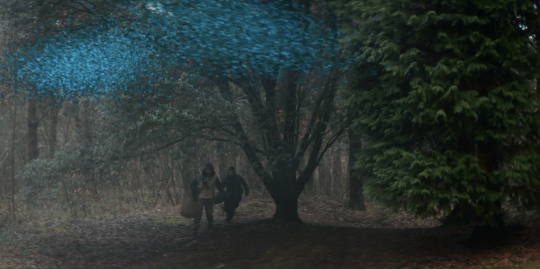
As you recall, last week ended on a cliffhanger. In wack ass fashion, it picks up just in time for the Doctor to do something. Instead of rendering Yaz into a sexy swarm of dust, Chibnall reigns in his base instincts and has the Doctor fall into a big ol’ time storm, complete with giant stompy gold ladies. Chibnall is the man who introduced both furries and vore into Doctor Who, so of course, he gave the giantess fans something to glom onto. For a guy who doesn’t understand youth culture much, Chibbers is all about that fursona. Clearly, I’m joking but it does amuse the hell out of me. Speaking of furries though, we’re given a bit of a Beauty and the Beast story in the form of Bel and Vinder. The whole thing plays out like a fairy tale, which is most likely the influence behind the episode’s title. Think about it. Vinder is exiled in a prison of his own making, represented metaphorically as a rose. Bel’s name is like Belle, and she spends the majority of her story talking to an anthropomorphic appliance. That works, I guess. Bit of a stretch?
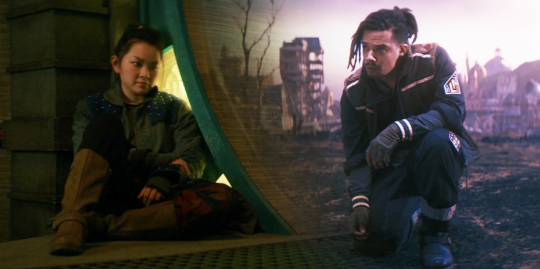
It’s been an itching sensation at the back of my mind for the past three weeks that Chibnall wasn’t writing two companions, but rather three including Vinder. Perhaps Vinder’s role was originally supposed to go to John Barrowman before all of that sex pest business. That would require the audience to fall in love with a new guy right away. I can’t think of a single character who could maybe have benefitted from a bit of that screen time. Nope. Nobody at all. We get about 20 minutes of Vinder’s backstory that tells us more about him than Yaz has gotten in three seasons. If Chibnall really has read my letters, then he definitely heard me say “Show, don’t tell.” I’m big on that concept. But did we really need an entire backstory devoted to learning about why Vinder was exiled to the Rose space station? Does anyone even really care? This is one of the few times I would have thought to say “Tell, don’t show.” The payoff for Vinder had better be worth it because the introduction of Bel throws out Yaz’s hopes of shagging. Or maybe it doesn’t. You, and Yaz, and baby, and me makes four. That’s how it goes, right?
Vinder’s whole deal is that he’s part of some freakishly loyal military on his home planet. He holds allegiance to a guy who goes by the Serpent. The Serpent’s whole deal is looking like David S Pumpkins if he went through an Ed Hardy phase. He hangs out with a couple of people who look like Sun Ra but don’t get any dialogue. During a meeting, the Serpent orders Vinder to turn off a recording device so that he may speak candidly about murder. Vinder carries a lot of guilt for having turned off the recorder, thus aiding in destroying evidence of murder. This is part of his and the other companions’ greatest hits being played out in the time storm. The Doctor protects her friends by hiding them from the Ravagers within their own lives. During this, she keeps popping into their realities to scream exposition at them while she fixes things. Seeing her floating there like a disembodied ghost made me laugh because she reminded me of Stuey Gluck from “Freaked.”

There’s a weird cartoonishness about the Doctor in this episode. At times it’s amusing, such as seeing her as a policewoman talking to Yaz. Seeing Jodie’s Doctor in a uniform of authority is like a Vincent Adultman “two kids in a trenchcoat,” vibe. And while she does momentarily, if not metaphorically, don a cool darker coat, a lot of the intensity from last week gets undercut. For starters, we lose a bit of her enigmatic nature when we hear her inner thoughts as a voiceover. The thoughts that did leave her mouth, with equal amounts of intensity were mostly exposition. You could easily have turned this story into a Big Finish audio based on how the Doctor is constantly explaining what’s in front of us. But why so much explanation when you are simultaneously showing it? It all leads back to the writing. There are too many ideas going on at the moment that none of them has any time to breathe. We need to be told what we’re seeing because it doesn’t make any sense otherwise. The best way I can think to describe it is an absolute clusterfuck.

Already we’ve seen people on social media defending the episode by attacking people’s intelligence. There’s a flippant implication that if anyone left this episode feeling confused, that it is some sort of failing on their behalf. It reeks of “Was Poop Dragon supposed to be hard? I beat him on the first try.” And like ProZD also said- “Siri, how do I delete all of Twitter?” You see, sometimes stuff is confusing on purpose, like a David Lynch movie. Or Ingmar Bergman. Or Andrei Tarkovsky. Maya Deren. Derek Jarman. Alejandro Jodorowsky. Chris Chibnall. Wait, how did he get in here? Because other times, it’s confusing on a structural level. I was able to give a decent plot synopsis above. I’m not confused by the story. It’s the pacing, the editing, the directing, and, of course, the writing.
One of the points I made in my review for “The Halloween Apocalypse,” is that Chris Chibnall seems to never know when to divulge information and to what degree. He keeps long-running plot threads looming over his entire run as showrunner which do more to frustrate than tantalise. He likes to stop the action dead in its tracks so that characters can sit and talk about their feelings. There’s a herky-jerky start-stop rhythm to his work as if he is never quite sure how far he wants to take a concept. Take the Ruth Doctor, or “Fugitive Doctor,” for instance. We really needed to see more of her at the end of “The Timeless Children,” so last night was the perfect opportunity to showcase her more. We could have finally gotten some much needed screentime from Jo Martin. While we get some decent dialogue between her and the Doctor, we missed a great opportunity to give a Doctory speech to the Ravagers. What should have happened is we see the speech start as Jodie and end as Jo. Instead, the bulk of the monologue is delivered by Jodie with flashes of Jo to remind us this is one of her memories. What should have been the best scene in the episode is undercut by the fact that they gave the bulk of the dialogue to the wrong actor.
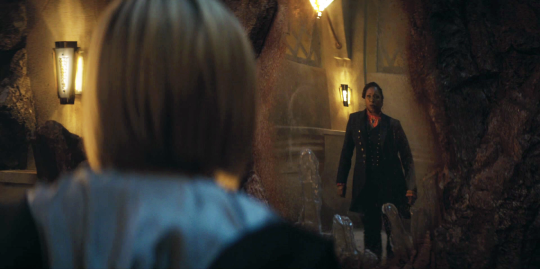
You could argue that this is the Thirteenth Doctor’s era and that she takes precedent. But she’s not really is she? It’s a symptom of the Doctor being saddled with another Doctor. Hell, she doesn’t even get her own comics. She shares that honour with the Tenth Doctor. What’s worse is the Fugitive Doctor is currently the more compelling of the two, due to her air of mystery. She embodies the Who of Doctor Who far more than Whittaker. The sad part is that it’s all leading toward solving that mystery. Leaving no question left unanswered. No room to dream. No room to wonder. The Timeless Child. If Chibnall wanted to show some real swagger, he would never fully explain her. Let us bunch of nerds argue about it as he walks away, not looking back at the explosion.
One thing we learn about the Ravagers is that they have a rather blasé attitude toward genocide. While killing one person and killing one person full of millions of people is exactly the same, visually, it does up the ante a bit. Learning that those big beefy Wish mask dudes weren’t actually security muscle, but rather walking prisons, was actually pretty cool. I joked last week that Chibnall was ripping off Faction Paradox stories, but now we’ve got people who are bigger on the inside. The reason I like this is that it was a fun idea. It’s a quick and easy way to demonstrate the cruelty of the Ravagers. Swarm and Azure get described as a sort of virus of existence. Sadly, explaining them has also defanged them a bit. As they left defeated, I wouldn’t have been surprised if they had hissed and swatted like kitty cats as they backed away. But that’s fine. That egg had to crack sooner or later.
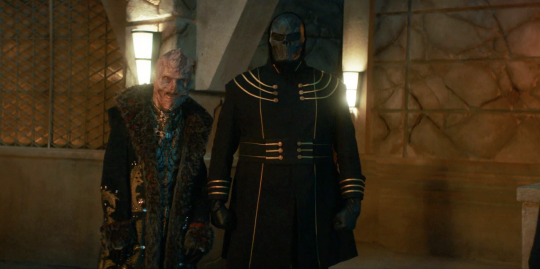
After talking the gold ladies into joining up to defeat the Ravagers, the Doctor is able to repair the triangle’s little machine that… I dunno, tempers the time storm? Is the time storm the same thing as the time vortex? Is it the same thing as the Flux? It’s hard to say. These questions have yet to be answered. Or maybe they have and audio mixing has been that bad. Seriously, I have missed at least 30% of the dialogue this season due to muddy sound design. The Doctor saves time and her companions. She very reliably pilots her unreliable TARDIS to drop Vinder off on his homeworld which was also hit by the flux. This explains why Bel experienced time fluctuations in her story, and why she was running away from Cybermen and bad CGI Daleks. What it doesn’t explain is why they tried to sell this episode as a Cyberman story. The Cybermen are so inconsequential to the story that I forgot them as I forgot about Joseph Williamson or the weird floating house. Remember the lady watering plants? She’s new! There’s just too much going on.

Mr Williamson’s addition is a rambling incoherent mess, which tracks with the rest of this story. What wasn’t drowned out by the poor sound mixing was nonsense as far as I was concerned. Also mostly forgotten are the companions. We get a bit of interest as Dan’s relationship with Diane gets explored, but it’s all a bit of a smokescreen as it’s all happening within the time storm. Even the scene we get with Yaz isn’t real, which explains why her sister claims nobody calls video games “video games.” What the hell else would you call them, Chris? Televised interactive computer programs? Or is it just “games,” now? Did you learn that from your kids, Chris? Did you come in like “Are you winning son?” while your kid is into hour 800 of Roblox and they looked at you and said “They’re called games, dad. Jeez!” He then did a kickflip and skated away. As I said, this episode is perplexing for all of the wrong reasons.
Not to go unforgotten is the TARDIS, which has mostly gone forgotten. I get that due to the cliffhangery nature of this series, the Doctor hasn’t really had the time to tend to her time machine, but yeah, it’s due. The reason for this probably has something to do with the fact that Chibnall probably wants to save this for episode six. Judging by the preview of next week’s episode, it’s going to be a monster of the week story like last week. I’m sensing a pattern. One episode is a sort of bridge episode to a normal episode. You go from a mess, to a story, to a mess, to a story. I get it, really I do. Some episodes are setups for the next episode. While “Dune,” is a great book, its follow-up “Dune Messiah,” acts as more of a bridge to get to the third book “Children of Dune.” Perhaps the Weeping Angels are to blame for what’s happening to the TARDIS. They seem to have infected Yaz’s life, why not the TARDIS as well?

These are small questions I have leading into chapter four. But unlike last week, where my interest in the story stemmed from investment, my interest now stems from confusion. I’m now watching on autopilot. I’ve lost interest in the overarching storyline and am only really interested in the possibility of the spooky Halloween episode I originally wanted from the actual Halloween episode. An episode with the Weeping Angels in a big creepy house sounds a damn sight more interesting than watching the Doctor float around and scream at everyone. The scary thought is that the Weeping Angels may have as much to do with that story as the Cybermen did with this one. I no longer trust Chris Chibnall to deliver any kind of closure in any kind of timely manner. We’re either going to learn about the Fugitive Doctor in chapter six, or we’re going to have to wait until Jodie Whittaker’s final episode. Neither would surprise me at this point.
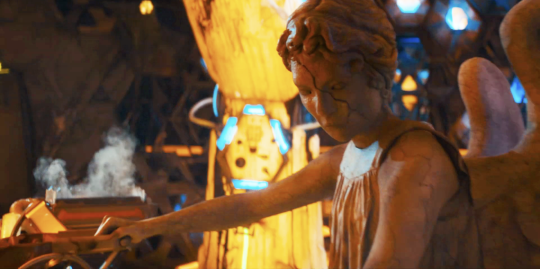
With just three episodes left, it’s easy to think we’re in the homestretch with Chibnall, but then you remember the holiday specials and that we’re only a third of the way there. I’m assuming the BBC ordered an episode of Doctor Who for their 100 year anniversary, which means we might not even see an ending to this era until October of next year. Ideally, I would like to see “Flux,” resolve not just the Ravagers storyline, but also the Fugitive Doctor. It would be really nice to be able to put a lid on this Timeless Child malarky. To borrow from John Mulaney, having Chris Chibnall in charge of Doctor Who is a lot like having a horse in the hospital. It’s hard to rest or feel confident when there’s a horse in the hospital! While it’s still ongoing, every new episode is a potentially ruinous story that could undermine the integrity of Doctor Who. Last week I would have been a little more generous. But after watching Chris Chibnall backslide into bad habits so spectacularly, I’m no longer cautiously optimistic. I’m just cautious.
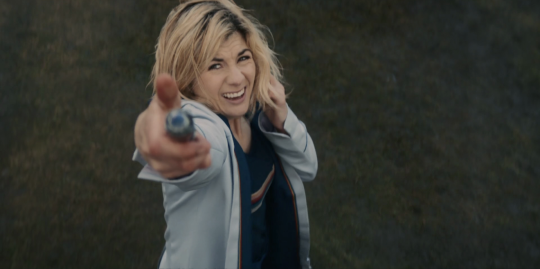
Since its inception, Doctor Who has utilised the power of the cliffhanger in an attempt to draw viewers back to the next week’s episode. This is mostly due to the stories being presented in a serialised format. The story isn’t over, but the episode is, so they needed something to entice viewers back. Oftentimes it was the Doctor or another protagonist about to meet an uncertain fate. Other times it was a big reveal, such as an alien peering out of the shadows. The problem with this format is that oftentimes the next episode would pick up right where we left off and the cliffhanger would resolve almost immediately. After being unsatisfied with how “The Empty Child,” and “The Doctor Dances,” run into one another, Steven Moffat adopted a new approach. He was quoted as saying- “My thing about cliffhangers is, it has to be a moment that changes the way you’re looking at it. It has to launch a completely different and hopefully unexpected phase of the story. It’s not just a movie cut in half.”
At the end of last week’s “The Halloween Apocalypse,” the Doctor and various other characters were facing the business end of a destructive force known as “the Flux.” Taking a page from Moffat’s playbook, Chibnall begins “War of the Sontarans,” in a completely different time and place. It’s a nice indication that while every story of Flux thus far has ended on some sort of cliffhanger, they aren’t just a movie cut in half (or sixths). Furthermore, it’s nice to see the episode had its own story arc, something of which had me worried after last week’s plotless beginning. Instead, we got a well-paced and beautifully directed episode of Doctor Who. And despite what other reviewers have said, I found it refreshing.
Once again, we’re given more moments as the Doctor and Yaz’s personalities continue to crystalise. I really enjoy Jodie Whittaker’s new approach to the Doctor. She’s more snarky, if not a little mean, but not mean in a “gives the brown guy up to the Nazis,” sort of way. She’s mean in a “talks trash and gives vague threats,” sort of way. So much of her first two series made her come off as a kids show presenter, and I’m glad she’s seemingly shed that skin for a tougher exterior. Yaz, while not incredibly fleshed out, also seems to have more of a direct personality. We’re meeting the Yaz that has taken to becoming the Doctor 2.0 in the same manner of previous companions like Rose or Martha. She’s even gone as far as to write “WWTDD,” or “What would the Doctor do?” on her hand. I can imagine that will be a bit divisive within the fandom. It’s a froggy chair moment, and no I don’t mean the one from Animal Crossing. It’s like Marmite, you’ll either like it or not. I’m team Marmite, or rather, I’m team WWTDD. Both really.
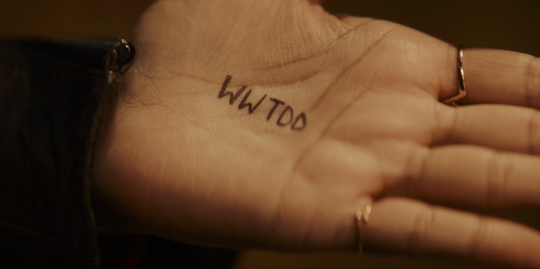
The episode wastes no time putting characters in their positions to play out like pawns in a chess game seemingly devised by the evil Swarm and his sister Azure. After discovering the TARDIS has taken them to the Crimean War, the Doctor, Yaz, and Dan are almost immediately split up. Fading away like a polaroid in a Back to the Future movie, Dan and Yaz find themselves transported away leaving the Doctor with her unreliable TARDIS. The TARDIS, still acting up, is rendered doorless as the Doctor frantically looks for a way into the safety of her phone box. Unable to swan off, the Doctor is forced to retreat from an anachronistic fleet of Sontarans. It’s around this time that the Doctor meets Mary Seacole and her “British hotel.” Chibnall’s penchant for historicals is evident at this point, but thankfully, his penchant for edutainment has not also returned. There are no moments when the Doctor stops what she’s doing to tell her companions the brief history of Mary Seacole. If “Rosa,” had ended with the Doctor looking directly into the camera saying “You can find out more at your local library,” I wouldn’t have batted an eye.
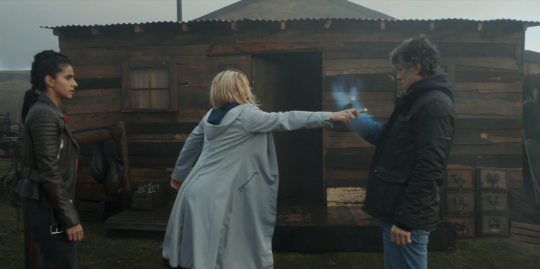
The Sontarans are back to being threatening again, but this isn’t to say they didn’t have questionable behaviour. Having slipped in through the Lupari shield just before the Flux, the Sontarans have claimed Earth as an outpost for Sontar. They did so by taking over Russia and China during the Crimean War. Like Dan and Yaz’s disappearance, it’s not really clear how or why the Sontarans or the Doctor ended up in the year 1855. The episode may have explained it, but I honestly could not tell you now. This could have something to do with the fact that the story is yet unfinished, or it could be the poor audio mixing that seems to be a theme this season. While the episode itself was nicely paced with creative direction and cinematography, the sound design was surprisingly lacklustre. Motives aside, the Sontarans of this story are on par with those of the two-part story “The Sontaran Stratagem/The Poison Sky.” It was also nice to see the return of Dan Starkey as yet another completely different Sontaran.
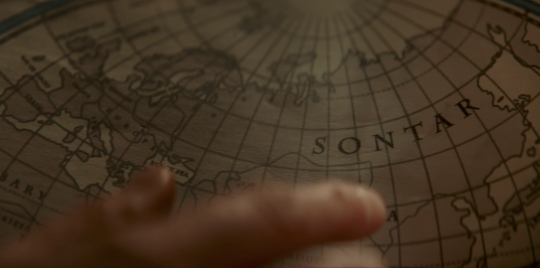
Back to the present day in Liverpool, Dan has discovered his beloved home is now the Earth capital of Sontar, but that doesn’t mean the Liverpudlians have taken this new threat lying down. Armed with pots and pans, they fight back against the Sontarans with a good whack to their probic vents. Among these rebels are Dan’s parents Eileen and Neville. If you recall, it was rumoured that Dan would be the son of a former companion, a rumour that can now be put to rest. Eileen and Neville serve up heavy Elisabeth Sladen and Nicholas Courtney from “The Sarah Jane Adventures,” vibes. Pepper in a dash of Wilfred Mott and Sylvia Noble and you’ve got Dan’s parentage. They’re a cute addition to the story that does great work to lighten the mood a bit.
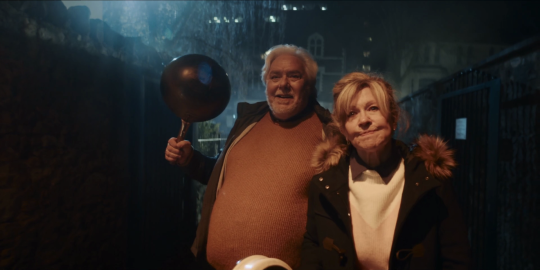
Across both timelines, the human resistance to the Sontarans fight their respective battles. Dan, armed with a wok, infiltrates a Sontaran ship, while the Doctor attempts to avoid bloodshed altogether. I liked how the Doctor uses Mary Seacole’s hotel as a sort of base of operations. Her and Mary have a nice rapport as two women trying to avoid the inevitable war between British forces and the Sontarans. I was giddy when the Doctor used her being a woman to trick the Sontarans into a parlay under the guise of having information about the male Doctor they know and fear. It took them three years, but they finally found a way for the Doctor’s femininity to take part in the storyline. Ultimately the talks fail as Sontarans would rather die than make some sort of peace accord with an inferior species such as humans.
The story attempts to portray the British soldier General Logan as a fool, but I found him to be a man stuck between two impossible choices- fight the Sontarans or let them roll across Europe for the glory of Sontar. Only after watching his battalion get crushed is he willing to hear the Doctor’s perspective. I’d also like to add that I rather liked the battle scene. A lot of the visuals of this season have been exactly what they needed to be. I saw a funny post the other day celebrating the fact that the Sontarans look like shit again, and it’s true. It’s nice to see that Doctor Who knows when to look real and when to look fantastical. In this instance, it was great to see the cameras pull back to a wide-scale battlefield. It sounded echoes of “The War Games,” which were compounded when the Doctor and her new friends discover the Sontarans are using a camouflage shield to divide the battlefield from their base of operations.

It was nice to see Mary doing some spy work, though I question the intelligence behind setting up her spy post in the exact point of a known doorway in the shield. That seems like a good way to get caught. The shots of the Sontaran base from on high stirred memories of Mordor and the witch’s castle in “The Wizard of Oz.” If they had shown the Sontarans marching back and forth singing the March of the Winkies, it wouldn’t have felt out of place. Mary learns that the Sontarans sleep for only seven minutes every 27 hours. Despite Mary’s competency and ability to adapt, I was massively disappointed when Chibnall decided in all of his infinite wisdom to have her state that she has no idea what’s going on. She may not understand the technology in front of her, but I would say she’s doing just fine for a woman who cares for a wounded Sontaran and infiltrates their base. Claiming she doesn’t know what’s happening felt like a betrayal of her intelligence and her agency. That’s a bad Chibnall!

If the Doctor’s plan sounds familiar, it’s because it’s the same plan the Doctor had in “The Sontaran Experiment.” The idea of destroying the Sontaran’s food and energy sources is exactly how they foil the plans of Field Major Styre. This wouldn’t be the first time the new series of Doctor Who used key plot points from classic Doctor Who. In “Rise of the Cybermen,” they replace the mirror planet Mondas with a mirrored universe. The plot of “The Silurians,” is ripped off wholesale in “The Hungry Earth/Cold Blood,” two-parter, also written by Chris Chibnall. Perhaps Chibnall is just Doctor Who’s reboot guy. He rebooted “The Silurians,” he rebooted the Cartmel Masterplan, and now he’s rebooted “The Sontaran Experiment.” This isn’t incredibly egregious, but I must say it does hurt the story in an unexpected manner. If the Sontaran’s major weakness is revealed in the past to be their reliance on their foodstuffs, why the hell are they all taking their seven-minute recharge simultaneously? Even idiots in horror movies know to have a guard on duty while everyone else gets a bit of kip. If you were generous, you would say it’s hubris, but it does make the Sontarans seem rather stupid.

I suppose that’s a potential pitfall in any Sontaran story. It’s easy to want to write them as stupid. They’re so serious and yet, they look so much like potato men. Moffat even went as far as to portray them as dumb enough to not notice that while their tank was invisible, they were not. So sure, why not leave yourself open to attack for seven minutes? And sure, why not keep access to their reserves at a height easily reached by humanoids? It’s not like they only protected these precious valves with a single panel that could be removed with a sonic device, the known tool of their oldest enemy, the Doctor. Oh, they did? Oh. Right. As I said above, their actions are a bit questionable. Honestly, though, I am okay with this for one reason- it gave us an ending. It was nice to see the Doctor have a plan and for that plan to play out. It may have been a bit naff, but it still felt like a run of the mill episode of Doctor Who, which, these days, is quite a lot. It makes as much sense as Donna being able to survive the atmosphere aboard a Sontaran ship. Just go with it.
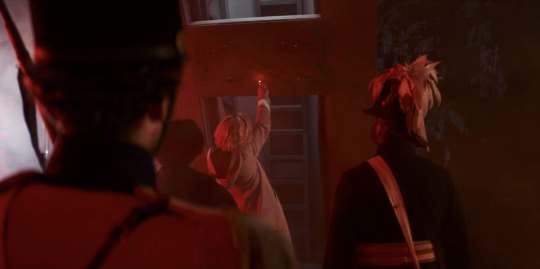
Dan and the Doctor’s adventures conclude in similar fashions- with giant explosions. One orange, one blue. On the Doctor’s end, it’s at the hands of Logan who blows them sky-high with barrels of gun powder. The Doctor admonishes him, but I have to admit, from his perspective, I once again understand his actions. Sure, she can send the Sontarans packing, but Logan can’t take the chance that they might come back. Like Captain Magambo in “Planet of the Dead,” his main concern is for the human race. The Doctor won’t always be there to save humanity. While I don’t stan General Logan, I do understand his motivations. On Dan’s end of things, he and his new Lupari friend, Karvanista, destroy the Sontarans with a sort of temporal bomb. How this bomb actually functioned was a load of bafflegab, but it certainly did the trick. It may be a bit a cliche at this point to end a Doctor Who episode by putting everything back in its place, but I don’t mind, personally. It seems within the realm of a time travel show that you could remove all traces of a thing using time travel technology.
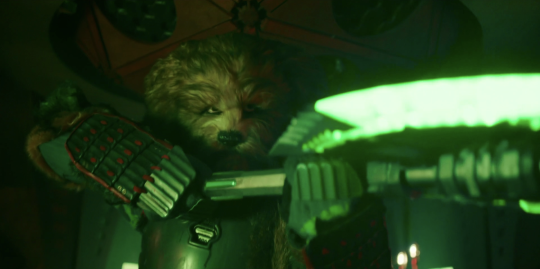
Speaking of time travel technology, we are now getting a clearer picture as to why the TARDIS has been less than reliable. It would appear that the black goo we’ve seen dripping from her columns is some sort of corruption. Perhaps Swarm and Azure are using it to pilot the TARDIS to their location. Either way, at the moment it means the Doctor is no longer able to rely on her constant companion. I don’t quite understand the motivation here as the show has never really needed a reason for the Doctor not to use the TARDIS at every opportunity. Sure, there are times when the TARDIS takes a plunge into the odd Satan pit, but usually, they just have the Doctor not use the TARDIS. Because let’s be real, if this wasn’t a fictional show, there would be no reason not to use the TARDIS all the freaking time. Got Daleks? No problem. Materialise around them and drop them into the sun. Easy peasy. See? That would be very boring.

Not to be forgotten, Yaz has now met up with Vinder. The Flux has deposited Vinder to the same location as Yaz- a planet called Time. On this planet, a group of monks or priests in the form of floating triangles have conscripted both of the young heroes as repairers. They need their circle of witches machine fixed, for some reason. We’re also met once again by the character Joseph Williamson. Williamson is the same guy I forgot was in chapter one, who seemed to be running the weirdest dig site ever. This time he’s seen rambling in the corridors of this temple known as the Temple of Atropos. Is it just me or has Chibnall gotten better at naming stuff? Atropos is a far cry better than “Ranskoor Av Kolos,” a name of which I constantly have to look up. Even Lupar and Karvanista are decent names.

The Swarm and Azure sequences give me “Kinda,” vibes. They take a sort of relish in menacingly chewing scenery that reminds me of the Mara. However, I would be remiss if I didn’t point out just how many similarities I see between this series of Doctor Who and the MCU. Perhaps it was unavoidable when “Loki,” introduced the concept of the Time Variance Authority. But having an extremely powerful villain that uses a giant destructive cloud that eats everything in its path reeks of Kang the Conquerer. Especially when said bad guy casually avoids death by zapping from place to place as if already knowing where the killing blow will land. People joked about how close Vinder’s appearance was to that of Michael B Jordan’s “Killmonger,” from “Black Panther,” but maybe they were onto something?
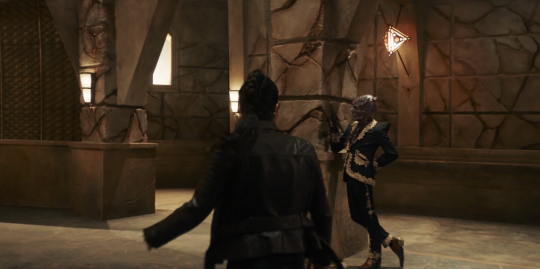
As much as I have enjoyed the performances of both Azure and Swarm, I find them to be the most worrying aspect of the storyline. I can’t shake the feeling that their story ties into the cringe-inducing Timeless Child storyline. When they mentioned that “Time” is a planet, I began to worry that Chibnall was up to his worst inclinations. But I’m also trying to be open-minded, so I am also allowing myself room to be pleasantly surprised. I think a lot of people think Chibnall’s detractors want to see him fail. I want Chris Chibnall to succeed. I want Doctor Who to be good. If I want Chibnall to fail in any manner, it would be for him to fail in ruining the show. I want him to succeed at keeping the show afloat. I want him to fail at running it into the ground. Who the hell would like to see Doctor Who be bad?

One aspect I found really interesting about the storyline is where it was revealed that the circle of time guardians was purposely “broken.” These “Mouri,” are quantum locked, seemingly to keep Swarm and Azure from being able to harm them. Why this is interesting is that, up to this point, the only things that are quantum locked in Doctor Who are the Weeping Angels. Seeing as “Flux,” has already incorporated the Weeping Angels into the storyline, I can’t help but wonder if we’re not going to get a sort of origin story for them. I know Rassilon condemned the dissenting Time Lords to be like “the Weeping Angels of old,” but that doesn’t really mean that’s where they come from. I would be interested in such a storyline. And while the idea of the baddies ripping apart time makes me worry that Chibnall is still trying to do lasting damage to the show, it could also be a lot of fun to see what comes of it. Azure and Swarm seem to revel in toying with time that echos the Faction Paradox. Hopefully, they’ll be even a fraction as good. Chibnall decided to borrow from Andrew Cartmel to disastrous ends, so why not Lawrence Miles? I kid.
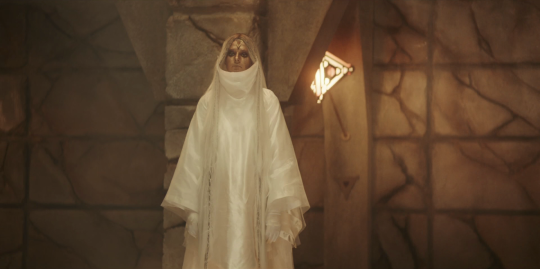
As I said, I enjoyed this episode. It might even be one of my favourite Chris Chibnall stories overall. Dan continues to charm, though I hope the next thing he does with his wok is cook a damn meal. At this point he’s gone from work, to capture, to a battle, and not a single banger or tattie to tide him over. That man needs a kebab like Commander Skaak needs to ride a horse! While the episode is by no means perfect, it met my number one criteria- it was fun to watch. Any story can be picked apart and held up to harsh light, but storytelling isn’t real life. I told my good friend Taryn that even if this series goes down as one of the worst in the show’s history, that this episode would be worth revisiting. There aren’t many episodes in the Chibnall era that I would like to revisit, save for maybe “The Witchfinders,” or “It Takes You Away,” but this one I could return to. What’s more, is that it doesn’t need a hokey cliffhanger to entice me back for the next episode. At this point, I’m invested.

In the past twelve days since my last update, I have been dancing around the idea of writing a follow-up article. While I think it was fairly obvious how I felt leading up to series thirteen, I felt as though I hadn’t quite captured what I was trying to say. To be honest, I didn’t enjoy writing about how unenthused I have been for more Doctor Who. It’s not a great feeling, furthermore, I dislike the idea of adding to the vitriol on the internet. Despite my reservations, I kept coming back to one question- what if we’re wrong? What if all of this is leading somewhere exciting? Ultimately, I decided against the article as I felt that it would not be long enough to justify writing it. But the question persists. It wasn’t until last nights episode when I finally was able to put into words what’s been bugging me- one of Chris Chibnall’s biggest failings is also the thing that keeps me returning.
“The Halloween Apocalypse,” starts with a bang. I want to say that upfront. I loved the Doctor and Yaz’s banter. Both Whittaker and Gill seemed to be having a great time. The special effects were pure cheese like something from a Power Rangers episode, and I appreciated the effort. Seriously, I loved how dumb it was. Because first and foremost, the one thing I’m looking for from Doctor Who is that it be fun. The Doctor and Yaz hanging over a pit of acid is daft, and cute, and fun. I also liked that the Doctor even somewhat planned everything to the point of setting up a trampoline to catch her and Yaz. That moment gives the Doctor some agency and makes her feel a bit crafty and for lack of a better word- Doctory.

I also really loved seeing Yaz with some much-needed personality. It almost illustrates immediately that maybe three companions was too many. Since we last saw her, Yaz has been given a little bit of a shot in the arm. She’s no longer with the police, and she’s fallen into a groove as a companion. I was reminded of Rose’s character arc wherein she goes from a young shopgirl to a Doctor in training. Yaz is shown punching buttons and giving directives. There seems that she has been given a more definitive character, and I am hoping that it doesn’t disappear in chapter two like Ryan’s dyspraxia. If it can remain consistent, I will be very excited.

Along with Yaz’s characterisation, it feels as though we’re finally seeing Jodie Whittaker’s Doctor take a little more form. I liked seeing her being a bit more assertive and comfortable with herself. There was a bit where her weird morality comes into play where she talks to Yaz as though showing her wondrous things excludes her from having to be honest. It felt a bit like when the Doctor failed to meet even the most basic of requirements for comforting a friend afraid of having cancer. But on the other hand, it reminded me a bit of moments when the Tenth Doctor threw his weight around and acted selfishly. I’m ok with the Doctor not being a great person, so long as the writing understands the implications. This seemed ok to me.
The problem I had with this episode, I now realise is the problem I’ve had with all of Chris Chibnall’s era of Doctor Who- there’s not a lot of resolution to be found anywhere. Clearly, the first episode of a greater six-part story is allowed to end on a bit of a cliffhanger, but on its own, very little happens. It’s a lot of set-up for chapter two. I only hope that chapter two isn’t, in turn, a lot of set-up for chapter three. You see, we’ve been given a lot to go off of, but very few postmarks that allow us to trace our journey. Yes, we’ve met the Ruth Doctor, but who is she? Is she even actually the Doctor? The way in which the Doctor side-eyes her in “The Fugitive of the Judoon,” makes me wonder if she might not be the Doctor. Everything thus far has been a lot of promise, with not a lot of payoff. We should have learned more about the Ruth Doctor by the end of series twelve, but we were only left with more questions.
Not even the resolution of “The Timeless Children,” elucidated much for us as the audience. Nothing about the storyline played into the action beyond being an info dump. Compare this to the end of series four. Throughout all of series four, we’re constantly hearing about planets that have gone missing. It’s such a basic science fiction trope that you’d barely even notice it as it’s happening. Of course, the Adipose breeding planet went missing, that’s the kind of thing that happens in sci-fi. Davies took this basic trope, seeded throughout series four, and built it into one of the best series finales. Not only had these planets gone missing, but they were also being used by the Daleks to create the reality bomb. The most the Timeless Child does to inform the story is to give the Master motivation to destroy Gallifrey. Knowledge gained in this way doesn’t further a plot, it just vomits information at us.

I feel like a lot of Chibnall’s writing would go over better if he gave the audience more moments of resolution. It reminds me a lot of Trenzalore, a concept drawn out by Steven Moffat to the point where it became more annoying than intriguing. Just tell the story you want to tell, stop implying that we’ll get there someday. Davies wasn’t afraid of peppering in clues or hints, but they all led to a finale. Both Moffat and Davies understood that while you could tell an overarching plot, each individual episode had its own sort of arc. They would leave room for further intrigue, while still giving us clear resolutions to individual episodes. In this way, the structure of “The Halloween Apocalypse,” worries me. It’s about the dissemination of information. I mentioned in my last article that I figured one episode would be the Weeping Angels episode, and one would be the Sontarans episode, and while they would be a part of a greater story, they would also stand alone as individual stories. What we got instead was an hour of set-up. I was looking forward to a spooky Halloween episode filled with Weeping Angels, but instead, we got a glimpse at the Weeping Angels and a mountain of exposition.

This seems to be a recurring problem in Chibnall’s writing. Not knowing when to give information. Not knowing when to let something be its own story. Take “Revolution of the Daleks,” for instance. We get a pretty good concept of the UK government using Daleks as the police and another good concept of the Doctor’s prison break. Both concepts could have been an episode on their own, but are instead dropped together in the same story. The consequence of which is that neither story is properly explored. “The Halloween Apocalypse,” suffers from this lack of breathing room. So much information is dropped up front that by the end, you feel more overwhelmed than informed. And look, I get it, if you’re constantly being called the boring guy, you would want to put as much excitement and promise into that first episode as possible. That’s totally fair, but I know I’m not the only one who felt overwhelmed by the info dump. The fact that the sound mixing was muddy didn’t help either.
The closest thing we’re given to a plot is in the form of newcomer Dan’s run-in with Kavanista, a Lupar soldier who could best be described as a Chewbacca-spaniel. The Doctor and Yaz have been pursuing him so the Doctor to could learn more about her past. As it turns out, Kavanista’s mission is to rescue Dan from the Flux, a devastating force in space, threatening to wipe out the entire universe. The Lupar race is evidently a kind of companion race to humanity, and each of them has been assigned a human to protect from the Flux. Their big plan is to wrap the planet earth in a network of ships like they were the Nova Corps. I think. Don’t quote me on that. How their ships could handle the Flux where whole planets failed is anyone’s guess.

My current theory is that the Flux is somehow related to the new baddies in town- Swarm and Azure. As villains go, they’re not bad. There’s not a lot to go off of this early. Swarm has been imprisoned since the beginning of time but has spent the entire time planning and growing. He reveals himself to the Doctor while revelling in the fact that she doesn’t remember them. One can probably assume that he’s the reason the Doctor doesn’t remember being the Ruth Doctor, which is not exactly exciting as it all ties back to the Timeless Child, a storyline in which I have consistently shown very little interest. My initial reaction to Swarm and his sister Azure is that they feel a lot like Chris Chibnall took Tzim-Sha and mashed him up with the Eternals from “Can You Hear Me?” Swarm stands out, however, due to the strong performance given by Sam Spruell.

Throughout the episode, I was struck with the feeling that Chibnall was trying to evoke the experience of a classic Doctor Who serial. Oftentimes, classic serials would opt for a cliffhanger episode leading into the next. You could go a whole six weeks for certain elements to resolve. The difference is that the old serials didn’t also drop close to every possible story arc in the first episode. They allowed the story to tell itself slowly, over time. I’m willing to give that a lot of good faith, however, mostly due to the reasons I’ve already stated above. The main reason is that it’s only chapter one. That being said, I would have liked to have seen some of these story elements spread out a little more. Even “Game of Thrones,” with its many characters and plotlines took the time to parse out the information. As I said, I hope episode two is allowed to be a story arc on its own.
Speaking of Game of Thrones, one of the elements that worked the least for me was the inclusion of the character Vinder. From the space station “Rose,” Vinder is either stranded or maybe even exiled from his people, out in deep space. Vinder’s main role in the story is to passively watch as the Flux passes through and destroys planets in its wake. This is all fine and good, but I couldn’t for the life of me understand how fast the Flux moves. It appears to be engulfing planets around Vinder left and right, but never really encroaching on him or the space station. Vinder’s actual location in relation to the Flux is never quite clear. You think at times that he is about to die, but then the Flux seems lightyears away. Yet simultaneously it destroys planets all around. It reminded me a lot of when Whittaker’s Doctor bumps her hip to send her sonic screwdriver inexplicably into her hands, defying all laws of physics. The portrayal of Vinder and his position in relation to the Flux is poorly defined. I’m not even sure when or where Vinder is, but hopefully, that will come with time.

Judging by the movement of the Flux and the size of the universe, the human race has anywhere between 5 minutes and 75 billion years before it utterly annihilates the earth. It’s hard to tell, because, you know, space is massive. The Doctor pilots her TARDIS to Halloween, the day on which the Flux arrives to Earth. This comes after some weird behaviour on the TARDIS’ behalf. I really like the idea that the TARDIS is possibly dying. That’s a very cool concept for a story. My only fear stemming from that storyline is that they may use it as an opportunity to replace the TARDIS. Why this worries me (beyond the fact that the TARDIS is an institution and a character in her own right), is that I’m nervous they’re going to use this as an opportunity to replace the blue box. There have been really dumb rumours that they may change the police box because police aren’t that popular these days. Doing so would not only fix a problem that never existed, but it would also be the ultimate act of performative wokeness. Seriously, nobody wants that. The part of that storyline that is interesting to me is in seeing how the Doctor might save the TARDIS. It’s ok to put the TARDIS in peril, but at the end of the day, it’s not ok to kill her. Even Steven Moffat knew he couldn’t actually say the Doctor’s name. Some things, no writer has the right to change.

Next week is looking like it’s going to be the Sontaran episode. My hope for stand-alone stories may yet be fulfilled. Though we didn’t get our spooky Halloween episode, which was a major disappointment, we may still get some good self-contained episodes. As an American, I have always wished they would do a Halloween episode. I figured it would never happen as Halloween isn’t as big a deal here in the UK. It’s funny how Chris Chibnall seems to give me things I’ve wanted to see in Doctor Who, but his execution is so often lacking. I was hoping that they were going to try and add a little menace to the Sontarans, but instead we got more of the painfully unfunny humour about their appearance from the Moffat era. Sigh. You would think a Sontaran would wear his battle scars like a badge of honour, but here it’s a source of derision. It’s a disappointing choice, that, but I guess he’s trying to lean into what’s popular.

There’s a lot of setup in this story, culminating with the Doctor looking deep into the Flux, about to die inside an unreliable TARDIS. It’s not a bad place to be considering my attitude leading up to the episode. Obviously, some of my previous concerns remain, but most importantly, I had fun. Watching the Doctor and Yaz hold onto rockets like witches on brooms was a genuine delight. I also loved the Doctor hitting the Flux with the might of the time vortex only for it to do nothing. It nicely illustrated the inherent threat of the Flux. While I’ve not said much about him, Dan is a very sympathetic person. John Bishop’s accent may be a bit of a put-on, but he’s so damn charming that I hardly care. Lots of the acting was very strong. Much like Bradley Walsh, I feel as though both John Bishop and Sam Spruell are going to elevate what is on the page. This is a better place than where a lot of people are with the show at the moment. My friend Taryn told me that the only solace she has in the Chibnall era is that now there is an end in sight. She compared it to waking up three-fourths of the way into surgery and thinking “Well, at least it’s almost over.” It hurts, but it won’t hurt forever. For me, however, the most notable difference between my feelings before and after this episode is that now, I’m actually looking forward to the next one. Considering my pessimism just twelve days ago, that’s a hell of a turnaround.
